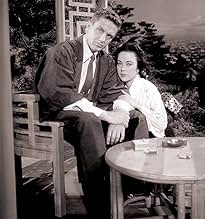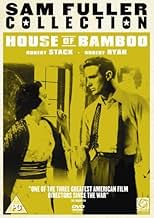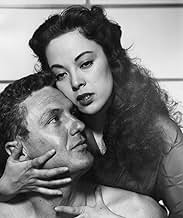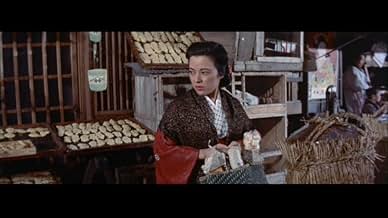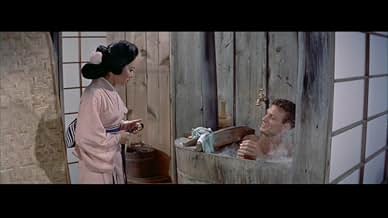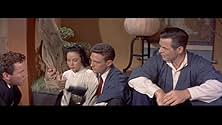AVALIAÇÃO DA IMDb
6,8/10
4,4 mil
SUA AVALIAÇÃO
Adicionar um enredo no seu idiomaPlanted in a Tokyo crime syndicate, a U.S. Army Investigator attempts to probe the coinciding death of a fellow Army official.Planted in a Tokyo crime syndicate, a U.S. Army Investigator attempts to probe the coinciding death of a fellow Army official.Planted in a Tokyo crime syndicate, a U.S. Army Investigator attempts to probe the coinciding death of a fellow Army official.
- Direção
- Roteiristas
- Artistas
Clifford Arashiro
- Policeman
- (não creditado)
Sandy Azeka
- Charlie's Girl at Party
- (não creditado)
Harry Carey Jr.
- John
- (não creditado)
Barry Coe
- Captain Hanson's Aide
- (não creditado)
John Doucette
- Skipper
- (não creditado)
Fuji
- Pachinko Manager
- (não creditado)
Samuel Fuller
- Japanese policeman
- (não creditado)
Peter Gray
- Willy
- (não creditado)
- Direção
- Roteiristas
- Elenco e equipe completos
- Produção, bilheteria e muito mais no IMDbPro
Avaliações em destaque
In the mid-1950s, using the same screenwriter (Harry Kleiner) and cinematographer (Joe MacDonald) as in the original, the unpredictable Samuel Fuller remade 1948's The Street With No Name as House of Bamboo. For starters, he set in not in anonymous Center City but in post-war Japan -- the first American movie filmed there since the Second World War.
Even in color, Fuller's Tokyo has a grey, slummy look to it, punctuated only by women in blood-red kimonos shuffling through the Ginza. It's an open city where vice flourishes and where ex-G.I. Robert Ryan runs a string of pachinko parlors as a cover for a crime ring. Military investigators and Japanese police tumble to these activities when a U.S. guard dies during a train robbery. And thus enters Robert Stack, sent by the army to infiltrate the gang and solve the murder.
Fuller deals his cards from a deck shuffled differently from his predecessor, William Keighley (who directed Street). It's not clear at the outset who Stack is, keeping us off-balance for a while; there's also a cross-cultural love affair between Stack and Shirley Yamaguchi, the widow of a slain gang member -- Ryan's standing orders are to leave no wounded to tell tales. A twisted erotic charge links Ryan to his pursuer; hinted at in the original, here it deepens the dynamic of Ryan's jealous obsession with his "ichiban," or favorite lieutenants.(There are enough sliding rice-paper screens to fill all of Douglas Sirk's movies with metaphorical barriers, too.)
Far from merely capitalizing on the 50s fad for shooting on locations around the newly opened globe, Fuller seems to construct another metaphor -- for the Occupation of Japan as exploitative, parasitic. Luckily he doesn't press this too far, and House of Bamboo stands as an offbeat, deftly made crime thriller from late in the noir cycle -- albeit with Mount Fujiyama squatting serenely in the background.
Even in color, Fuller's Tokyo has a grey, slummy look to it, punctuated only by women in blood-red kimonos shuffling through the Ginza. It's an open city where vice flourishes and where ex-G.I. Robert Ryan runs a string of pachinko parlors as a cover for a crime ring. Military investigators and Japanese police tumble to these activities when a U.S. guard dies during a train robbery. And thus enters Robert Stack, sent by the army to infiltrate the gang and solve the murder.
Fuller deals his cards from a deck shuffled differently from his predecessor, William Keighley (who directed Street). It's not clear at the outset who Stack is, keeping us off-balance for a while; there's also a cross-cultural love affair between Stack and Shirley Yamaguchi, the widow of a slain gang member -- Ryan's standing orders are to leave no wounded to tell tales. A twisted erotic charge links Ryan to his pursuer; hinted at in the original, here it deepens the dynamic of Ryan's jealous obsession with his "ichiban," or favorite lieutenants.(There are enough sliding rice-paper screens to fill all of Douglas Sirk's movies with metaphorical barriers, too.)
Far from merely capitalizing on the 50s fad for shooting on locations around the newly opened globe, Fuller seems to construct another metaphor -- for the Occupation of Japan as exploitative, parasitic. Luckily he doesn't press this too far, and House of Bamboo stands as an offbeat, deftly made crime thriller from late in the noir cycle -- albeit with Mount Fujiyama squatting serenely in the background.
This movie has similarities to THE THIRD MAN in that both involve someone (an American) living comfortably in an alien culture as a parasitic gangster in a war ravaged country just after WW2 with a good guy (another American) in pursuit. In narrow cinematic terms, in terms of the story as other reviewers point out, its not a great movie. There is though very much more of interest to it than that.
In historical terms we see Tokyo as it then was in 1954. We see the Japanese as officials, as policemen, as gangsters, the good, the bad, in their natural habitat rather than simply as massed cruel soldiery or suicidal pilots. It has elements of a travelogue with a fascinating glimpse behind the rice paper screen. The movie, which has really handsome colour photography, starts with the curious beauty of a snow covered landscape with Mount Fuji in the background and a murderous attack on a military supply train in the foreground. The ending too shares the same deliberate disjunction - dark violent justice dealt out in a sunny family setting - Top of the World, Ma?
Robert Stack here very much pre-figures his role as Eliot Ness in THE UNTOUCHABLES - dogged and brave in the fight against organised crime. Robert Ryan, tall impeccably elegant and seemingly entirely at ease as a violent mobster in a very foreign land.
Much criticism seems carping and misses the point. As was said of the dog that could walk upright - the question was not so much that he couldn't do it perfectly but that he could do it at all. This was a unique bold movie embedded in post WW2 underworld Japan really striving for authenticity. Not the customary montage of tourist sites and hotel interiors with a cast looking as if they'd gone no further than that themselves.
Were there American gangsters in this way in post war Japan? Presumably so if CATCH 22 is any guide. In this movie however the morality is old-fashioned, certain and unambiguous. By 1970 CATCH 22 served up satire and moral ambiguity to the Hippy generation.
A fascinating little bit of history as well as being a very watchable movie
In historical terms we see Tokyo as it then was in 1954. We see the Japanese as officials, as policemen, as gangsters, the good, the bad, in their natural habitat rather than simply as massed cruel soldiery or suicidal pilots. It has elements of a travelogue with a fascinating glimpse behind the rice paper screen. The movie, which has really handsome colour photography, starts with the curious beauty of a snow covered landscape with Mount Fuji in the background and a murderous attack on a military supply train in the foreground. The ending too shares the same deliberate disjunction - dark violent justice dealt out in a sunny family setting - Top of the World, Ma?
Robert Stack here very much pre-figures his role as Eliot Ness in THE UNTOUCHABLES - dogged and brave in the fight against organised crime. Robert Ryan, tall impeccably elegant and seemingly entirely at ease as a violent mobster in a very foreign land.
Much criticism seems carping and misses the point. As was said of the dog that could walk upright - the question was not so much that he couldn't do it perfectly but that he could do it at all. This was a unique bold movie embedded in post WW2 underworld Japan really striving for authenticity. Not the customary montage of tourist sites and hotel interiors with a cast looking as if they'd gone no further than that themselves.
Were there American gangsters in this way in post war Japan? Presumably so if CATCH 22 is any guide. In this movie however the morality is old-fashioned, certain and unambiguous. By 1970 CATCH 22 served up satire and moral ambiguity to the Hippy generation.
A fascinating little bit of history as well as being a very watchable movie
I had fun through most of House of Bamboo, Samuel Fuller's second widescreen, first filmed out-of-the-US picture, even as I knew at the end it wasn't too special. It's got some memorable scenes with the two male leads, the kind of seemingly hard-boiled actors that probably wouldn't shake much if you hit them with some punches. And the whole plot line of the American crime ring in Tokyo in 1955 gives enough room for Fuller to realize some of the acting, camera and editing possibilities at his big-studio disposal. Robert Stack is in one of his best early parts as a would-be big crook undercover for the US army who infiltrates Robert Ryan's 'organization', where its tightly run to the point where Ryan's ready and willing to kill his own if wounded in the moment of crime. On top of this, Stack falls for a 'kimono' who was married to a late-member of the crime team. But will the deceiving remain?
The majority of the film works under the crime parts of the story, where in some scenes (maybe or maybe not in the new cinema-scope style) Fuller just keeps the camera on the scene without cutting. This room and space and time does create the right tension- and occasional humor- in the right spots. And Ryan is also up to task as the cold antagonist. Yet if there are parts of the film that are lesser than the bulk of it I'd say it would be with the 'Kimono' Mauriko, played by Shirley Yamaguchi. Her part in the story is mandatory to be sure, but it is just so-so in the writing and delivery, as far as such a formula would allow. And it is probably more of the writer's fault and even on Yamaguchi's end, arguably, than Fuller's. There are also some typical, dated bits of 'lost in translation' moments that may be part of the deal in making the very first Hollywood movie filmed entirely in Tokyo- they're 50/50 of doing the job for the entertaining parts of the picture.
Nonetheless, House of Bamboo is a more than decent example of what can be done with other material from one setting into another (both from a 40's noir, Street with No Name, and from US to Japan). There is also a sweet, if not greatly paced, climax in a wheel machine on a roof. It's gritty machismo with fun, with enough pure Fuller to suffice the studio standards.
The majority of the film works under the crime parts of the story, where in some scenes (maybe or maybe not in the new cinema-scope style) Fuller just keeps the camera on the scene without cutting. This room and space and time does create the right tension- and occasional humor- in the right spots. And Ryan is also up to task as the cold antagonist. Yet if there are parts of the film that are lesser than the bulk of it I'd say it would be with the 'Kimono' Mauriko, played by Shirley Yamaguchi. Her part in the story is mandatory to be sure, but it is just so-so in the writing and delivery, as far as such a formula would allow. And it is probably more of the writer's fault and even on Yamaguchi's end, arguably, than Fuller's. There are also some typical, dated bits of 'lost in translation' moments that may be part of the deal in making the very first Hollywood movie filmed entirely in Tokyo- they're 50/50 of doing the job for the entertaining parts of the picture.
Nonetheless, House of Bamboo is a more than decent example of what can be done with other material from one setting into another (both from a 40's noir, Street with No Name, and from US to Japan). There is also a sweet, if not greatly paced, climax in a wheel machine on a roof. It's gritty machismo with fun, with enough pure Fuller to suffice the studio standards.
House of Bamboo may look like a standard B crime-picture, but in amongst the noirish trappings, the somewhat forlornly straight-forward plot, the workmanlike performances, there lurks one of the few genuine portraits of post-War Japanese life ever attempted by an American filmmaker. The director, Sam Fuller, is clearly in love with Japan; his fascination with Japanese culture, art, daily ritual, suffuses House of Bamboo so completely that one almost forgets, at times, what it's supposed to be about. Its story - an undercover army cop infiltrates a group of ex-soldiers running a robbery ring in a rebuilding Tokyo - seems little more than a pretext, an excuse for Sam Fuller to indulge his Japanophilia, his fetish. But Fuller, always the pro, at least pays some attention to his story between excursions onto the Japanese street in search of background detail, local color, bits of peripheral business, and manages despite his preoccupations to deliver a satisfyingly vigorous, if slightly routine-seeming, exercise in crime melodrama.
Fuller, schooled as a journalist, had mastered the art of hard-hitting, well-paced, detail-oriented storytelling, and House of Bamboo is one of his stronger, more tightly-structured works. It's set in Japan in the years just after the war, a time when there is still a strong American military, and criminal, presence in Tokyo. Eddie Spannier (Robert Stack) has just arrived in Tokyo from the U.S., intending to hook up with his old army buddy Webber (Biff Elliot); he learns to his dismay, however, that Webber has been killed by hoodlums, leaving him twisting in the wind. Some casual thuggery at a pachinko parlor brings Spannier to the attention of Tokyo's resident American crime-boss, Sandy Dawson (Robert Ryan); after screening Spannier, Dawson decides to invite the ballsy newcomer into the gang. Spannier, we soon discover, is actually an undercover army cop (he never knew Webber, isn't named Spannier) trying to track down the perpetrators of a recent train robbery which left a soldier dead. As part of his cover, Spannier recruits the dead man Webber's ex-girlfriend, Mariko (Shirley Yamaguchi, merely adequate), a Japanese woman, who poses as his "kimono girl."
Fuller's staging is remarkable from the first moments of the story; the train-heist is carried off with terrific economy and skill, a memorable three-tiered image of the train poised atop an overpass with Mt. Fuji looming in the background (the "real" Japan hovering over the new, American-infested one), punctuated by two grimly matter-of-fact images of the dead soldier's shoes sticking up from the snow. In Tokyo Fuller goes into Pickup on South Street mode, cluttered waterfronts, a sense of teeming life all around the action, if not the sweaty intimacy and sense of menace he brought to his Widmark-starred masterpiece. No one had a better sense of a location than Fuller, who jammed more side detail, more realistic human activity into a few frames of his under-estimated Western classic Forty Guns than exists in all of Fred Zinnemann's hopelessly limp, over-praised High Noon. A perusal of House of Bamboo uncovers such nuggets as the scene where Spannier, played by the disheveled, mainly inexpressive Robert Stack (he wears his trenchcoat like a bathrobe), happens upon a Noh theater rehearsal going on atop a roof, and a later moment where a quaint Japanese fan-dance suddenly morphs into a raucous jitterbug, the dancers ripping off their traditional attire to reveal the '50s get-ups underneath. These scenes are, of course, more than just bits of color; Fuller penetrates the surface of his melodrama by suggesting all sorts of simmering tensions, the sense of American culture bleeding into Japan, changing it maybe not for the better. This material makes up the real, underlying film, the incongruity of traditional Japanese costumes, architectural forms, performance styles finding their way into what would seem to be a standard Hollywood cops-and-robbers exercise, and the larger cultural struggle this would seem to embody. Only the scene where Gary Cooper and Burt Lancaster happen upon the court of the Emperor of Mexico in Aldrich's Vera Cruz tops for aesthetic disjointedness the scene of an apparently half-wasted Stack in his comically shabby hood-just-off-the-boat get-up stumbling upon the garishly dressed and made-up Noh performers, and nearly being knocked off his feet by one of them.
It's amazing the way Fuller uses the camera, not just the fact that he conceives brilliant shots, but that he always knows how and when to use them. He has an almost Griffith-like instinct for the big moment, the expressive image: for instance; the scene where Webber lies dying on a gurney, Fuller shooting the entire thing from a wide, high angle, then slowly coming in when the interrogating officer shows him a picture of his girlfriend, at which point Fuller cuts to a devastating P.O.V., the photograph coming poignantly into focus. Another shot shows his playfulness: a Japanese guy sits at a desk, the camera pulls back, we see that the desk is actually poised atop a balcony over a frantic room where Robert Stack is being prodded by the Tokyo cops. The best moment is less acrobatic but far funnier: Spannier is trying to shake down a pachinko boss, he gets attacked from behind and thrown through a paper wall into an office where his mark, the crime-boss Sandy (played by Robert Ryan with a psychotic pleasantness, that strangely tender note in his voice contrasting his completely deranged behavior), sits balanced on a chair, waiting to greet him. There's always this touch of eccentricity in Fuller, this out-of-leftfield quality, which is what distinguishes his work from that of more predictable, generally better-publicized, unforgivably more-highly-regarded directors (Zinnemann, Kazan, Robson, et al).
Fuller, schooled as a journalist, had mastered the art of hard-hitting, well-paced, detail-oriented storytelling, and House of Bamboo is one of his stronger, more tightly-structured works. It's set in Japan in the years just after the war, a time when there is still a strong American military, and criminal, presence in Tokyo. Eddie Spannier (Robert Stack) has just arrived in Tokyo from the U.S., intending to hook up with his old army buddy Webber (Biff Elliot); he learns to his dismay, however, that Webber has been killed by hoodlums, leaving him twisting in the wind. Some casual thuggery at a pachinko parlor brings Spannier to the attention of Tokyo's resident American crime-boss, Sandy Dawson (Robert Ryan); after screening Spannier, Dawson decides to invite the ballsy newcomer into the gang. Spannier, we soon discover, is actually an undercover army cop (he never knew Webber, isn't named Spannier) trying to track down the perpetrators of a recent train robbery which left a soldier dead. As part of his cover, Spannier recruits the dead man Webber's ex-girlfriend, Mariko (Shirley Yamaguchi, merely adequate), a Japanese woman, who poses as his "kimono girl."
Fuller's staging is remarkable from the first moments of the story; the train-heist is carried off with terrific economy and skill, a memorable three-tiered image of the train poised atop an overpass with Mt. Fuji looming in the background (the "real" Japan hovering over the new, American-infested one), punctuated by two grimly matter-of-fact images of the dead soldier's shoes sticking up from the snow. In Tokyo Fuller goes into Pickup on South Street mode, cluttered waterfronts, a sense of teeming life all around the action, if not the sweaty intimacy and sense of menace he brought to his Widmark-starred masterpiece. No one had a better sense of a location than Fuller, who jammed more side detail, more realistic human activity into a few frames of his under-estimated Western classic Forty Guns than exists in all of Fred Zinnemann's hopelessly limp, over-praised High Noon. A perusal of House of Bamboo uncovers such nuggets as the scene where Spannier, played by the disheveled, mainly inexpressive Robert Stack (he wears his trenchcoat like a bathrobe), happens upon a Noh theater rehearsal going on atop a roof, and a later moment where a quaint Japanese fan-dance suddenly morphs into a raucous jitterbug, the dancers ripping off their traditional attire to reveal the '50s get-ups underneath. These scenes are, of course, more than just bits of color; Fuller penetrates the surface of his melodrama by suggesting all sorts of simmering tensions, the sense of American culture bleeding into Japan, changing it maybe not for the better. This material makes up the real, underlying film, the incongruity of traditional Japanese costumes, architectural forms, performance styles finding their way into what would seem to be a standard Hollywood cops-and-robbers exercise, and the larger cultural struggle this would seem to embody. Only the scene where Gary Cooper and Burt Lancaster happen upon the court of the Emperor of Mexico in Aldrich's Vera Cruz tops for aesthetic disjointedness the scene of an apparently half-wasted Stack in his comically shabby hood-just-off-the-boat get-up stumbling upon the garishly dressed and made-up Noh performers, and nearly being knocked off his feet by one of them.
It's amazing the way Fuller uses the camera, not just the fact that he conceives brilliant shots, but that he always knows how and when to use them. He has an almost Griffith-like instinct for the big moment, the expressive image: for instance; the scene where Webber lies dying on a gurney, Fuller shooting the entire thing from a wide, high angle, then slowly coming in when the interrogating officer shows him a picture of his girlfriend, at which point Fuller cuts to a devastating P.O.V., the photograph coming poignantly into focus. Another shot shows his playfulness: a Japanese guy sits at a desk, the camera pulls back, we see that the desk is actually poised atop a balcony over a frantic room where Robert Stack is being prodded by the Tokyo cops. The best moment is less acrobatic but far funnier: Spannier is trying to shake down a pachinko boss, he gets attacked from behind and thrown through a paper wall into an office where his mark, the crime-boss Sandy (played by Robert Ryan with a psychotic pleasantness, that strangely tender note in his voice contrasting his completely deranged behavior), sits balanced on a chair, waiting to greet him. There's always this touch of eccentricity in Fuller, this out-of-leftfield quality, which is what distinguishes his work from that of more predictable, generally better-publicized, unforgivably more-highly-regarded directors (Zinnemann, Kazan, Robson, et al).
After World War II, Hollywood saw the Far East as simply a new background for familiar heroics... "House of Bamboo" was in fact a remake of a 1948 gangster melodrama called "The Street With No Name" with Richard Widmark...
An army cop (Robert Stack) with a charming widow (Shirley Yamaguchi) moves into undercover action in collaboration with the Japanese security authorities against Tokyo gangsters, and their leader Robert Ryan, an intellect mastermind racketeer, head of an impressive organization engaged in robberies, fraudulent businesses, and murder whose plots challenge the magnificent effort of the international police..
With fascinating Japanese locations and photographed in CinemaScope and Technicolor, the film depicted the wonders of Fujiyama, the extraordinary city of Tokyo and its back streets in water ways invoking mystery and intrigue...
An army cop (Robert Stack) with a charming widow (Shirley Yamaguchi) moves into undercover action in collaboration with the Japanese security authorities against Tokyo gangsters, and their leader Robert Ryan, an intellect mastermind racketeer, head of an impressive organization engaged in robberies, fraudulent businesses, and murder whose plots challenge the magnificent effort of the international police..
With fascinating Japanese locations and photographed in CinemaScope and Technicolor, the film depicted the wonders of Fujiyama, the extraordinary city of Tokyo and its back streets in water ways invoking mystery and intrigue...
Você sabia?
- CuriosidadesAccording to Robert Stack, Samuel Fuller told an actor to go down really low when he passed a 50-gallon drum. Without informing the actor, the director had a sharpshooter on a parallel who shot over the man's head and into the drum. After it blew up, the actor said, "Jesus Christ! Those were real bullets!" Fuller laconically replied, "Don't worry. He knew what he was doing."
- Erros de gravaçãoSandy fires an awful lot of shots from his pistol (which is a revolver) without ever appearing to reload it.
- Citações
Sandy Dawson: Who are you working for?
Eddie Kenner: [posing as Eddie Spanier] Spanier.
Sandy Dawson: Who's Spanier?
Eddie Kenner: Me.
Sandy Dawson: Who else you working for?
Eddie Kenner: Eddie.
- ConexõesEdited into Paixões que Alucinam (1963)
Principais escolhas
Faça login para avaliar e ver a lista de recomendações personalizadas
- How long is House of Bamboo?Fornecido pela Alexa
Detalhes
- Data de lançamento
- País de origem
- Idiomas
- Também conhecido como
- House of Bamboo
- Locações de filme
- Tóquio, Japão(rooftop playground of the Matsuma department store)
- Empresa de produção
- Consulte mais créditos da empresa na IMDbPro
Bilheteria
- Orçamento
- US$ 1.380.000 (estimativa)
- Tempo de duração
- 1 h 42 min(102 min)
- Proporção
- 2.55 : 1
Contribua para esta página
Sugerir uma alteração ou adicionar conteúdo ausente




